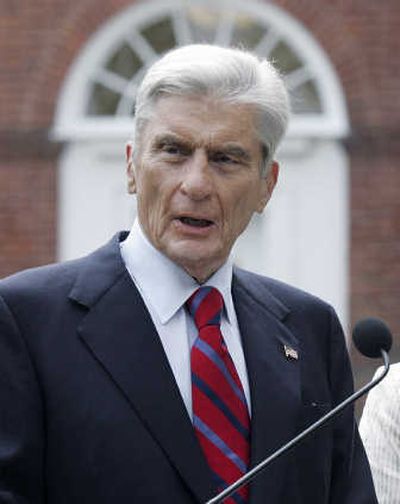Virginia’s Warner will retire

CHARLOTTESVILLE, Va. – U.S. Sen. John Warner, who through three decades in office transformed himself from an object of curiosity and occasional ridicule into a respected elder, announced Friday that he’ll retire at the end of his term.
“There is a fullness of time when men should go and not occupy too long the ground to which others have the right to advance,” Warner said, quoting Thomas Jefferson.
“So I say with great humility and thankfulness in my heart, I yield that ground so that others can advance.”
Warner said his “work and service to Virginia as a senator” will end Jan. 6, 2009.
The closely guarded but widely expected announcement triggered a bipartisan flood of tributes to Warner, 80, whose tenure in the Senate has been marked by unwavering support for the U.S. military and high-profile battles with fellow Republicans.
Much at stake
Warner’s announcement also marked the unofficial start of what promises to be a tough campaign to replace him. At least two Republicans and one Democrat are considered likely candidates. And with Democrats holding a one-vote majority in the Senate, the stakes are high.
“I think the approach he took will be remembered and I hope emulated by others,” former Gov. Gerald Baliles, a Democrat who now directs the University of Virginia’s Miller Center of Public Affairs, said of Warner. The veteran senator “listened carefully, he reflected upon his options and he made his decisions with a great deal of courage,” Baliles added.
“He is a country gentleman, a legal scholar, a historian, a great storyteller, and an esteemed statesman, all with the joy in life of a 12-year-old boy,” said former Sen. George Allen, a Republican whom Warner mentored during Allen’s six years in the Senate.
Gov. Tim Kaine, a Democrat, called Warner “a strong and reliable partner to my administration.” And Sen. Jim Webb, also a Democrat, hailed him as “the quintessential Virginia gentleman.”
Warner “has maintained an independence and clarity of thought that are becoming all too rare in Washington,” Webb said.
Warner’s valedictory came with the kind of flourish Virginians have come to expect from a man who Senate colleagues often privately refer to as “the squire.”
Rather than declare his plans in a Senate committee room, where his career has been focused, Warner chose a sunny spot in front of the Jefferson-designed Rotunda at U.Va., where he attended law school after World War II.
He kept his decision secret to everyone but his family until he announced it Friday afternoon. His wife, Jeanne, who stood alongside him as he made the announcement, said he had wavered back and forth through six months of deliberations.
Hopes to retire strong
Warner acknowledged this summer that he was keeping a diary as he pondered his decision, recording the days so he could reflect on the demands of the job and his desire and willingness to keep up his pace through another term.
He had watched the long decline of South Carolina Sen. Strom Thurmond and insisted for years that he would leave the Senate while his mind was still sharp and his body healthy. He had even told journalists they should confront him and write about his health if they saw him slipping.
He still feels strong, Warner insisted Friday, and came through a recent trip to Iraq “just as well as when I was in boot camp with the Marines.”
But a doctor had admonished him that “the 80s are your golden years – enjoy them,” he added.
Leading voice on defense
Warner’s retirement will cut substantially into Virginia’s clout in the 111th Congress, which convenes in January 2009. Warner ranks 12th in the Senate in seniority, and sixth among Republicans.
Warner prepares to depart the Senate as his perhaps his party’s most influential voice on defense issues, a role he carved out in the 1980s and cemented in the 1990s as senior Republican and later chairman of the Senate Armed Services Committee.
Once a reliable supporter of the Bush administration’s decision to go to war in Iraq, Warner has emerged this year as a leader of efforts to scale back the U.S. occupation and force Iraq’s fledgling government to secure the country.
After a visit to Iraq last fall, he returned home to declare the country was “drifting sideways” and spurred a Pentagon and White House review of U.S. strategy.
He declined to support the troop “surge” that review produced, while bucking Democratic initiatives to block it. And last month, after another trip to the war zone, he urged Bush to begin bringing troops home voluntarily.
Warner said Friday that his retirement announcement may strengthen his hand in upcoming debates about the war.
“No one can say politics is going to dictate, in one way or another, how I’m going to decide and speak out what’s in the best interest of this nation,” he told reporters.